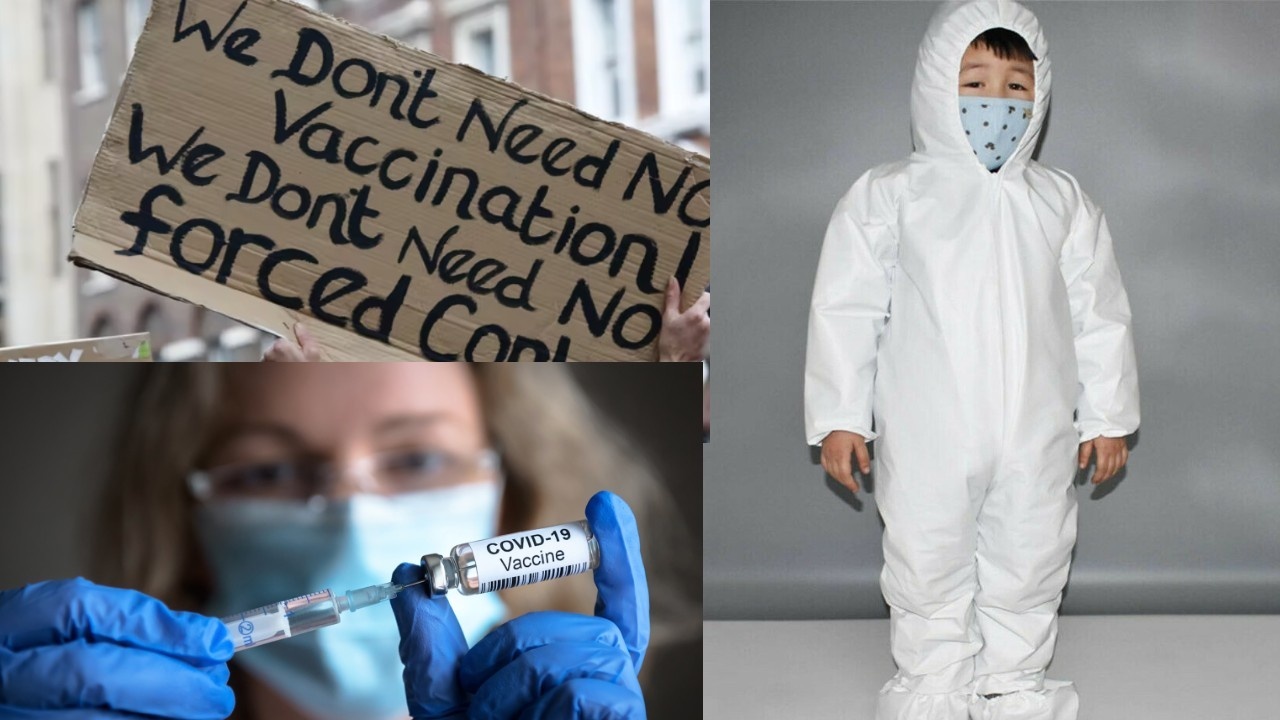COVIDians vs COVIDiots - The Dialectic
Jan 06, 2022
A dialectic in the Hegelian sense refers to the interaction between two ideas - a thesis and an anti-thesis - to create a third idea - a synthesis. Parliamentary democracy can be seen as the synthesis between two older ideas - the absolute monarchism of Louis XIV (who famously said “I am the state”) and the direct democracy espoused by many of the early French Revolutionaries.
Are we witnessing a COVID dialectic? That’s the question raised by this episode of The Drive with Dr. Peter Attia, which offers an insightful overview of our current situation through a conversation between three medical doctors.
At one point the doctors posit a dialectic between “COVIDians” and “COVIDiots”. I suspect most of us intuitively know what those terms mean even if we haven’t heard them before. A “COVIDiot” probably identifies as right-wing, thinks no one should ever vaccinate, doesn’t wear a mask no matter the situation and might think of Ivermectin as the only therapeutic drug that does anything against COVID. A “COVIDian” probably identifies as left-wing, thinks everyone should get vaccinated (and boosted), always wears a mask or two, and thinks stay-at-home orders are always justified.
Both a COVIDian and a COVIDiot could find scientific evidence to back up their particular policy position, but neither of the positions would qualify as evidence-based. They are better understood as tribal policy positions.
What does it mean for a policy position to be tribal? If someone says “I double-mask” on their Twitter profile pic, what that individual is really saying is the following: “I identify as part of the tribe that believes in science, follows instructions, and is willing to put the needs of others over my own.” On the other hand if someone’s profile pic says “Say no to vaccines” what they’re really saying is “I identify as part of the tribe that believes in individual liberty, that understands that this virus is not as serious as we’ve been told, and that distrusts authorities on principle, especially those with a poor track record.”
Both of these positions can be defended by appeal to facts. A lot of people on the COVIDian side will deny this, but COVIDiots have a lot going for them. It is simply true that officials have been wrong about a lot of things. Anthony Fauci, without a doubt the most powerful official on these issues, was saying that the risk of COVID was “minuscule” as late as February of 2020 when many other scientists were already sounding the alarm. He also famously was opposed to masks before he was in favor of them. A good estimate of the Infection Fatality Rate (IFR) of COVID might be 0.2%, which makes it more serious than the flu, but arguably not serious enough to justify the draconian measures that many governments continue to take (even as the IFR is dropping due to better treatment options). Vaccines are very good at preventing serious illness, but they don’t seem to be very good at preventing transmission or promoting herd immunity, despite early claims that these would be the benefits of a vaccine.
Though both the COVIDian and COVIDiot position can be defended by an appeal to science, neither represents what would be a science-based policy. They represent advocacy positions on the one hand and pushback against those advocacy positions on the other.
At a certain point advocacy positions were defendable, in fact they were probably necessary. So for example there isn’t much evidence that cloth masks do much to prevent COVID transmission. But many people were strong advocates for cloth masks as a way to allow for an easing of the measures we refer to as “lockdown” - school closings, work from home, etc. So at that particular point in time it would have been counter-productive to point out that the evidence behind masks stopping the spread of COVID is limited and of poor quality. That doesn’t mean that those statements aren’t true, it just means that all things being equal I’d rather live in a society where I could travel with masks on than not travel at all.
But at some point in time that advocacy position becomes counter productive. When lockdowns are no longer an issue, masks become more about signaling a tribal affiliation than doing anything to prevent transmission. I don’t think you need me to tell you that wearing a mask at a restaurant for the few minutes before you start your meal only to take it off for the 30 minutes that you’re eating doesn’t do anything to reduce risk. So in this context what were once justifiable advocacy positions become “hygiene theater”. Ineffective mask policies are one example, but everything from physical distancing to vaccine mandates are open to this critique when we start looking at the current (and evolving) body of evidence.
Hygiene theater provokes a reaction. People who (perhaps correctly) point out that the data behind masking isn’t sufficient to justify these policy changes are ridiculed by policy advocates who ignore the nuance in order to be more effective champions for their cause. Ridicule is the opposite of logic. When we ridicule we try to marginalize voices that have every right to be heard (even if we don’t agree with them) through eliciting an emotional response. Telling a belittling joke is probably a more effective method of persuasion than presenting a complete and evidence based argument.
Through such tactics, advocates risk losing credibility. For example, I am a strong believer in the principle of vaccine equity. Every country and every citizen of any country should have access to vaccines regardless of their ability to pay. There are many strong arguments in favor of this position. But one argument that is not strong is that countries with low vaccination rates are more likely to serve as places for new viral mutations to emerge. That may be the case, but if so, it’s not currently supported by the literature. What is well understood is that viral mutations are more likely to emerge in patients who have a compromised immune system and are fighting for their lives against the virus. Such patients, even if fully vaccinated and boosted, are unlikely to have produced a proper immune response to the vaccine. So it’s not clear that providing universal access to vaccinations would do anything to reduce the frequency of mutations. Furthermore, respiratory RNA viruses tend to mutate in a beneficial way - they become less deadly and more contagious - so someone could reasonably make an argument against vaccine equity on the grounds that the world needs less deadly variants. The Omicron mutation strongly supports this hypothesis in that it appears to be significantly less deadly than its predecessors. So a bad argument for a good cause (and vaccine equity is a very good cause) may hurt more than it helps.
So what’s the solution? In Hegelian terms, what’s needed is not so much a solution but a resolution - the thesis and anti-thesis must give way to a new synthesis. An ideal synthesis would be the widespread acceptance of science-based policy making. It’s very clear what that would look like - stop testing except in symptomatic cases, focus on therapeutics and prevention (a drum I’ve been beating since the very beginning of this crisis), and use vaccines in the same way we use influenza vaccines, meaning that they’re used seasonally in vulnerable populations as well as being available to anyone who wants one.
But knowing what to do is the easy part. I have to be honest and say I have no idea how that can be done given the level of polarization I see in the United States and elsewhere. Once a society is divided on grounds that seemed rational at some point in time but now are based almost exclusively on group-think, how does that society move forward?
US President Biden has passed policies on vaccines and boosters despite resignations from leading scientists who have stated publicly that they would rather resign than be held accountable for policies that may harm people. The advent of the Omicron variant, which seems to be infecting the vaccinated and unvaccinated alike, was used as an opportunity to reenforce the need for vaccine mandates. Those who point out that the companies making money on vaccines might have an interest in vaccine mandates are dismissed as conspiracy theorists by people who should know that companies nearly always act in a way to maximize profit and market share. At this point neither side has a claim to scientific credibility.
With that caveat, it is certainly possible to find our collective way back to sanity. The government of Australia backing away from the imposition of new lockdowns and allowing the Omicron variant to run its course could be a game changer. The policy is likely to lead to more deaths and strain on the hospital system than we see in South Africa because the Australian population is largely COVID naïve. They’re heavily vaccinated, but they don’t have natural immunity. Nevertheless the Australian government is taking the decision, essentially acknowledging that this has to happen at some point if we accept that a “forever lockdown” is not an option.
If the Australian experiment ends well (and there’s every reason to think it could) that might inspire other people and other governments to be more vocal about designing a policy framework that meets the comprehensive needs of today, and not the fears and apprehensions of yesterday, as justifiable as those fears and apprehensions may once have been.
Thanks for reading. If you enjoy my writing, please do consider picking up a copy of The Health Dialectic.
🌱 Ready to Find Your Path to Gut Freedom?
Stop trying to solve your Crohn's, Colitis, or IBD alone with conflicting advice. A personalized plan is the fastest way to clarity and relief.
On a free call, you’ll get:
✅ Clarity on your triggers – Identify the dietary and lifestyle factors uniquely impacting you.
✅ A tailored starting point – Get actionable steps to reduce inflammation and calm your gut.
✅ Real answers – Ask anything about your symptoms and healing (no topic is off-limits).
💬 “Working with Sameer gave me a clear path when I felt completely lost. This is the guidance I needed.” – Previous Client
Your personalized plan is a conversation away.

